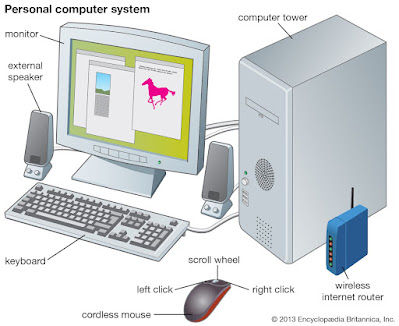- Get link
- X
- Other Apps
Computer Essay in English
Title: The Evolution and Impact of Computers: A Comprehensive Overview
Introduction:
The computer, an ingenious creation that has revolutionized the world, is an essential part of modern society. From its inception to the latest advancements, computers have reshaped industries, communication, and everyday life.
This essay delves into the history of computers, their societal impact, diverse types, software and programming languages, artificial intelligence, the internet's evolution, data privacy, cybersecurity, and future trends.
History of Computers:
The roots of computers can be traced back to ancient civilizations' counting tools and abacuses. However, the advent of the electronic computer marked a turning point. The ENIAC (Electronic Numerical Integrator and Computer), developed in the 1940s, was among the first programmable computers. The subsequent decades saw a rapid progression, leading to the development of microprocessors and the birth of personal computers in the 1970s.
Impact on Society:
Computers have transformed nearly every aspect of society. They have catalyzed automation, improved data analysis, and enabled global communication. Businesses rely on computers for operations, while the education sector employs them for enhanced learning experiences. Computers have facilitated medical research, revolutionized entertainment, and empowered creative endeavors.
Various Types of Computers and Their Uses:
Computers come in various forms, each designed for specific functions. Desktop computers are versatile workhorses, suitable for complex tasks and high-performance applications. Laptops offer portability without compromising computing power. Smartphones are mini-computers in our pockets, enabling communication, navigation, entertainment, and a plethora of apps. Supercomputers are at the forefront of scientific research, performing complex simulations and calculations that were once inconceivable.
Software and Programming Languages:
Software is the heart of every computer, enabling functionality and interaction. Programming languages serve as the bridge between human thought and machine execution. High-level languages like Python, Java, and C++ have made coding more accessible, enabling developers to create applications, games, and tools that shape modern life.
The Concept of Artificial Intelligence:
Artificial Intelligence (AI) is the emulation of human cognitive functions by computers. Machine Learning, a subset of AI, enables systems to learn from data and improve over time. AI has led to breakthroughs in image recognition, natural language processing, and autonomous vehicles. It has applications in healthcare, finance, and customer service, driving efficiency and innovation.
The Evolution of the Internet:
The internet, born out of ARPANET in the 1960s, has evolved into a global network connecting people, information, and devices. The World Wide Web, introduced in the 1990s, brought user-friendly interfaces and multimedia content to the internet. Social media, e-commerce, and online education have thrived, reshaping societal norms and communication patterns.
Data Privacy and Cybersecurity:
The digital age has raised concerns about data privacy and cybersecurity. The vast amounts of personal information stored and transmitted online have led to breaches, identity theft, and unauthorized access. Governments and organizations have implemented regulations and security measures to safeguard data, but the balance between convenience and privacy remains an ongoing challenge.
Future Trends in Computing Technology:
The future of computing promises exciting advancements. Quantum computing, with its potential to solve complex problems exponentially faster, holds promise for fields like cryptography and drug discovery. Edge computing brings processing closer to data sources, enhancing real-time applications. The Internet of Things (IoT) envisions a connected world where devices communicate seamlessly, transforming industries and daily life.
Conclusion:
The computer's journey from its primitive origins to its current state has been marked by innovation, adaptation, and transformative impact. Its evolution has spurred societal progress, revolutionized industries, and redefined communication. The intersection of computing with AI, the internet, and emerging technologies promises an even more interconnected and dynamic future, where challenges of privacy and security must be navigated alongside boundless opportunities for innovation.
Questions and answers about Computer
Q: When was the first computer invented?
A: The first electronic digital computer, known as the ENIAC, was invented in 1945.
Q: What was the purpose of the ENIAC computer?
A: The ENIAC was designed to perform complex calculations for scientific and military purposes, particularly for artillery trajectory calculations during World War II.
Q: How did computers evolve from the ENIAC?
A: Computers evolved from large, room-filling machines like the ENIAC to smaller, faster, and more powerful devices through advancements in integrated circuits and microprocessors.
Q: What was the significance of the invention of the microprocessor?
A: The invention of the microprocessor in the early 1970s revolutionized the computer industry by enabling the integration of multiple electronic components on a single chip, making computers smaller and more accessible.
Q: When was the first personal computer introduced?
A: The first personal computer, the Altair 8800, was introduced in 1975.
Q: How did the graphical user interface (GUI) change computer interaction?
A: The GUI, introduced by Xerox and popularized by Apple's Macintosh, replaced command-line interfaces with visual elements like icons and windows, making computers more user-friendly.
Q: What is the significance of the World Wide Web?
A: The World Wide Web, invented by Tim Berners-Lee in 1989, revolutionized information sharing and communication by allowing users to access and link documents on the internet through hyperlinks.
Q: How did laptops impact computer usage?
A: Laptops made computing portable and convenient, enabling users to work, browse the internet, and perform tasks on the go.
Q: What is the role of smartphones in computer evolution?
A: Smartphones represent a significant evolution by integrating computing, communication, and entertainment capabilities into a single handheld device.
Q: What is artificial intelligence (AI) and its role in computers?
A: Artificial intelligence involves creating computers that can perform tasks that typically require human intelligence, like speech recognition and decision-making.
Q: How has quantum computing impacted the field of computing?
A: Quantum computing explores the use of quantum-mechanical phenomena to perform certain types of computations much faster than classical computers, potentially revolutionizing fields like cryptography and optimization
- Get link
- X
- Other Apps

Comments
Post a Comment